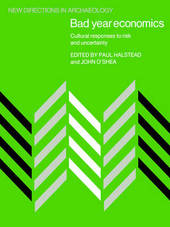
|
Bad Year Economics: Cultural Responses to Risk and Uncertainty
Paperback / softback
Main Details
| Title |
Bad Year Economics: Cultural Responses to Risk and Uncertainty
|
| Authors and Contributors |
Edited by Paul Halstead
|
|
Edited by John O'Shea
|
| Series | New Directions in Archaeology |
|---|
| Physical Properties |
| Format:Paperback / softback | | Pages:160 | | Dimensions(mm): Height 280,Width 210 |
|
| Category/Genre | Economic theory and philosophy |
|---|
| ISBN/Barcode |
9780521611923
|
| Classifications | Dewey:306.3 |
|---|
| Audience | | Professional & Vocational | |
|---|
| Illustrations |
Worked examples or Exercises
|
|
Publishing Details |
| Publisher |
Cambridge University Press
|
| Imprint |
Cambridge University Press
|
| Publication Date |
11 November 2004 |
| Publication Country |
United Kingdom
|
Description
Bad Year Economics explores the role of risk and uncertainty in human economics within an interdisciplinary and cross-cultural framework. Drawing on archaeology, anthropology, and ancient and modern history, the contributors range widely in time and space across hunting, farming and pastoralism, across ancient states, empires, and modern nation states. The aim, however, is a common one: to analyse in each case the structure of variability - particularly with regard to food supply - and review the range of responses offered by individual human communities. These responses commonly exploit various forms of mobility, economic diversification, storage, and exchange to deploy local or temporary abundance as a defence against shortage. Different levels of response are used at different levels of risk. Their success is fundamental to human survival and their adoption has important ramifications throughout cultural behaviour.
Reviews"This volume commends itself to a wide audience of archeologists, geographers, economic and ecological anthropologists, climatologists and economic historians. With the caveat that it gives little attention to instances of overt adaptive failure, the conceptual tools and potential for historical analogies it presents should be of interest to anyone concerned with the implications of present-day or future environmental changes for human well-being." Bruce Winterhalder, University of North Carolina, Chapel Hill, in Science
|